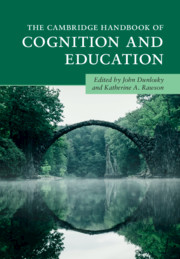Book contents
- The Cambridge Handbook of Cognition and Education
- The Cambridge Handbook of Cognition and Education
- Copyright page
- Contents
- Figures
- Tables
- Contributors
- How Cognitive Psychology Can Inform Evidence-Based Education Reform
- Part I Foundations
- Part II Science and Math
- Part III Reading and Writing
- Part IV General Learning Strategies
- Part V Metacognition
- 23 Self-Regulation in Computer-Assisted Learning Systems
- 24 Improving Students’ Metacomprehension Accuracy
- 25 Calibration and Self-Regulated Learning
- 26 Teachers’ Judgments of Student Learning of Mathematics
- 27 Learning Strategies and Self-Regulated Learning
- Index
- References
27 - Learning Strategies and Self-Regulated Learning
from Part V - Metacognition
Published online by Cambridge University Press: 08 February 2019
- The Cambridge Handbook of Cognition and Education
- The Cambridge Handbook of Cognition and Education
- Copyright page
- Contents
- Figures
- Tables
- Contributors
- How Cognitive Psychology Can Inform Evidence-Based Education Reform
- Part I Foundations
- Part II Science and Math
- Part III Reading and Writing
- Part IV General Learning Strategies
- Part V Metacognition
- 23 Self-Regulation in Computer-Assisted Learning Systems
- 24 Improving Students’ Metacomprehension Accuracy
- 25 Calibration and Self-Regulated Learning
- 26 Teachers’ Judgments of Student Learning of Mathematics
- 27 Learning Strategies and Self-Regulated Learning
- Index
- References
Summary
- Type
- Chapter
- Information
- The Cambridge Handbook of Cognition and Education , pp. 696 - 715Publisher: Cambridge University PressPrint publication year: 2019
References
- 18
- Cited by

